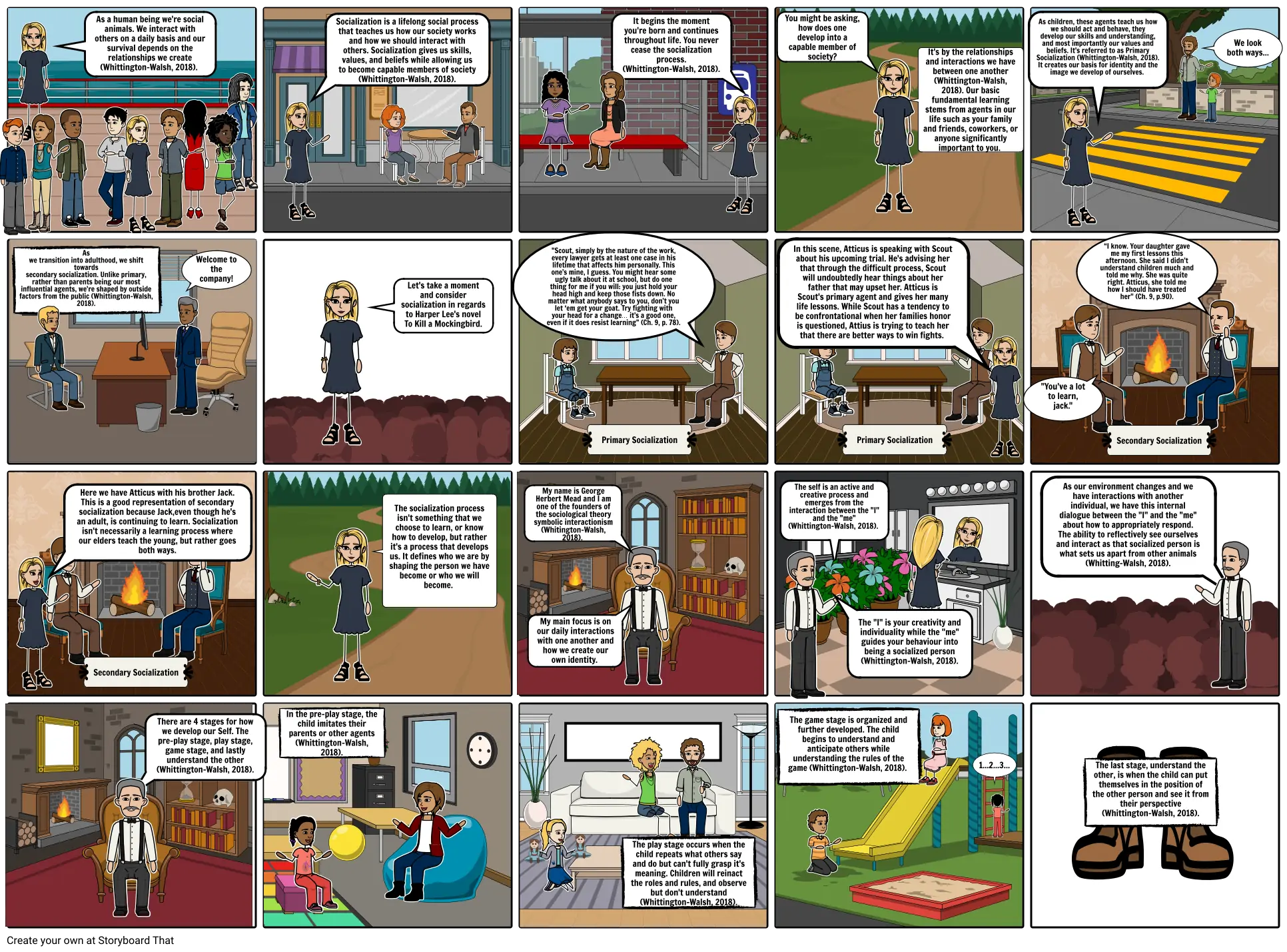Socialization

Storyboard Text
- As a human being we're social animals. We interact with others on a daily basis and our survival depends on the relationships we create (Whittington-Walsh, 2018).
- Socialization is a lifelong social process that teaches us how our society works and how we should interact with others. Socialization gives us skills, values, and beliefs while allowing us to become capable members of society (Whittington-Walsh, 2018).
- "Scout, simply by the nature of the work, every lawyer gets at least one case in his lifetime that affects him personally. This one’s mine, I guess. You might hear some ugly talk about it at school, but do one thing for me if you will: you just hold your head high and keep those fists down. No matter what anybody says to you, don’t you let ‘em get your goat. Try fighting with your head for a change… it’s a good one, even if it does resist learning” (Ch. 9, p. 78).
- It begins the moment you're born and continues throughout life. You never cease the socialization process. (Whittington-Walsh, 2018).
- You might be asking, how does one develop into a capable member of society?
- It's by the relationships and interactions we have between one another (Whittington-Walsh, 2018). Our basic fundamental learning stems from agents in our life such as your family and friends, coworkers, or anyone significantly important to you.
- As children, these agents teach us how we should act and behave, they develop our skills and understanding, and most importantly our values and beliefs. It's referred to as Primary Socialization (Whittington-Walsh, 2018). It creates our basis for identity and the image we develop of ourselves.
- “I know. Your daughter gave me my first lessons this afternoon. She said I didn’t understand children much and told me why. She was quite right. Atticus, she told me how I should have treated her" (Ch. 9, p.90).
- We look both ways...
- As we transition into adulthood, we shift towards secondary socialization. Unlike primary, rather than parents being our most influential agents, we're shaped by outside factors from the public (Whittington-Walsh, 2018).
- Welcome to the company!
- Let's take a moment and consider socialization in regards to Harper Lee's novel To Kill a Mockingbird.
- Primary Socialization
- To Kill a Mockingbird by Harper Lee
- In this scene, Atticus is speaking with Scout about his upcoming trial. He's advising her that through the difficult process, Scout will undoubtedly hear things about her father that may upset her. Atticus is Scout's primary agent and gives her many life lessons. While Scout has a tendency to be confrontational when her families honor is questioned, Attius is trying to teach her that there are better ways to win fights.
- Primary Socialization
- To Kill a Mockingbird by Harper Lee
- "You've a lot to learn, jack."
- Secondary Socialization
- Here we have Atticus with his brother Jack. This is a good representation of secondary socialization because Jack,even though he's an adult, is continuing to learn. Socialization isn't necessarily a learning process where our elders teach the young, but rather goes both ways.
- Secondary Socialization
- The socialization process isn't something that we choose to learn, or know how to develop, but rather it's a process that develops us. It defines who we are by shaping the person we have become or who we will become.
- My name is George Herbert Mead and I am one of the founders of the sociological theory symbolic interactionism (Whitington-Walsh, 2018).
- My main focus is on our daily interactions with one another and how we create our own identity.
- The self is an active and creative process and emerges from the interaction between the "I" and the "me" (Whittington-Walsh, 2018).
- The "I" is your creativity and individuality while the "me" guides your behaviour into being a socialized person (Whittington-Walsh, 2018).
- As our environment changes and we have interactions with another individual, we have this internal dialogue between the "I" and the "me" about how to appropriately respond. The ability to reflectively see ourselves and interact as that socialized person is what sets us apart from other animals (Whitting-Walsh, 2018).
- There are 4 stages for how we develop our Self. The pre-play stage, play stage, game stage, and lastly understand the other (Whittington-Walsh, 2018).
- In the pre-play stage, the child imitates their parents or other agents (Whittington-Walsh, 2018).
- The play stage occurs when the child repeats what others say and do but can't fully grasp it's meaning. Children will reinact the roles and rules, and observe but don't understand (Whittington-Walsh, 2018).
- The game stage is organized and further developed. The child begins to understand and anticipate others while understanding the rules of the game (Whittington-Walsh, 2018).
- 1...2...3...
- The last stage, understand the other, is when the child can put themselves in the position of the other person and see it from their perspective (Whittington-Walsh, 2018).
Over 30 Million Storyboards Created
No Downloads, No Credit Card, and No Login Needed to Try!
